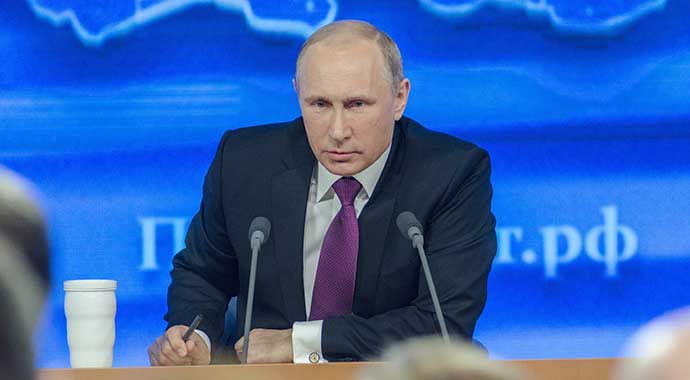 Ukraine is under fire and United States President Joe Biden and his NATO colleagues are talking tough on the Russian invasion of the country. But their hands seem tied.
Ukraine is under fire and United States President Joe Biden and his NATO colleagues are talking tough on the Russian invasion of the country. But their hands seem tied.
Russian President Vladimir Putin, the ex-KGB man, is already emerging as the winner of the first round of the battle for Kyiv.
Ukrainian President Volodymyr Zelenskyy said in a video address that his country had been “left alone” to fight Russia. “Who is ready to fight alongside us? I don’t see anyone.”
He said he contacted the leaders of 27 European countries and none directly responded to Ukraine’s request to join NATO. “Who is ready to give Ukraine a guarantee of NATO membership? Everyone is afraid.”
What’s keeping the U.S. and its NATO allies from reacting more strongly to the Russian act of war on Ukraine?
Very little except energy supplies.
In the immediate aftermath of the Russian assault on Ukraine, oil prices jumped on Thursday, with Brent crude rising above US$105 a barrel for the first time since 2014. Quoting David Frum of The Atlantic and author of Trumpocalypse: Restoring American Democracy (2020), Alex Kimani writes in Oilprice.com that Russia’s Ukraine invasion was greatly aided by high energy prices, especially natural gas.
 |
| RELATED CONTENT |
| Arctic security is being transformed by Ukrainian-Russian war By Robert Huebert |
| Ottawa sleeps while Russia executes its Arctic strategy By Joseph Micallef |
| Why was Canada kept in the dark about “AUKUS”? By Matthew Bondy and Jeffrey Collins |
The sharp rise in energy prices has helped Russia’s foreign exchange reserves hit US$630 billion, which represents 42 percent of the country’s US$1.5 trillion gross domestic product (GDP).
To make Russia pay for its Ukraine designs, the U.S. and its allies have developed a wave of sanctions. But Russian oil and gas flows were spared. And none of the first sanctions announced by the U.S., the European Union or the United Kingdom targeted any Russian bank that deals in Russian oil and gas transactions. In fact, the announced sanctions specifically allow energy payments to continue.
Biden and his partners appear to have few options. The global energy supply/demand balance is tight. And they couldn’t have helped but tighten it further through sanctions. After all, Russia is the world’s second-largest crude producer.
“As much as 2.3 million barrels per day (bpd) of Russia’s 4.6 million bpd of crude oil exports go to the West,” consultancy group Wood Mackenzie said in a note. Russia is also the largest provider of natural gas to Europe, producing about 35 percent of its supply.
“Given low inventories and dwindling spare capacity, the oil market cannot afford large supply disruptions,” UBS analyst Giovanni Staunovo said.
The markets are taking note of the West’s inability to do much more. Once the United States reiterated its decision not to sanction Russian energy exports, oil markets began cooling. Futures in New York traded near US$91 a barrel on Friday, from the highs of US$100 a barrel earlier in the week.
Friday’s pullback came after the U.S. State Department said it wouldn’t sanction Russian crude oil because that would harm U.S. consumers and not Russians.
The United States is working on various other options to cool the markets. Pressure has increased on major oil-producing countries – specifically Saudi Arabia and the United Arab Emirates, the two countries with significant spare oil capacity – to open their taps further.
And Biden announced the U.S. is working with other major oil-consuming nations on a co-ordinated release of crude from their strategic petroleum reserves. Analysts say such sales would have to be very large to impact prices significantly.
There also seems to be a new urgency to revive the nuclear deal between the U.S. and Iran. They have been engaged in indirect talks in Vienna that could lead to the removal of sanctions on Iranian oil sales.
Iran’s top security official, Ali Shamkhani, said on Twitter that significant progress has been made. A deal may be just a few days away.
Beyond those measures, Biden and his allies have few options. Energy markets depend a great deal on Russia. And Western leaders know it well. As a result, we’re getting less action and more rhetoric.
Toronto-based Rashid Husain Syed is a respected energy and political analyst. The Middle East is his area of focus. As well as writing for major local and global newspapers, Rashid is also a regular speaker at major international conferences. He has provided his perspective on global energy issues to the Department of Energy in Washington and the International Energy Agency in Paris.
For interview requests, click here.
The opinions expressed by our columnists and contributors are theirs alone and do not inherently or expressly reflect the views of our publication.
© Troy Media
Troy Media is an editorial content provider to media outlets and its own hosted community news outlets across Canada.


